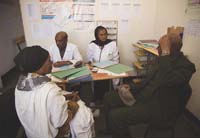18.3 Your roles in advocacy
As a Health Extension Practitioner, your main role in advocacy will be to secure the resources necessary to meet the health needs of your communities. To do this effectively requires you to undertake several key tasks, such as understanding the health needs of your communities and identifying the government officials and stakeholders with the power to determine health policy (Figure 18.4). You also need to be able to identify fundamental barriers and their solutions as well as identify the main problems or issues to be addressed. You then need to develop effective messages. So find a support group, or form a network and collaborate with them. To do this you need to develop your advocacy leadership skills.

18.3.1 Advocacy leadership skills
These skills include good listening skills, good written and oral communication skills, and the ability to develop supportive social networks and form strong coalitions and joint ventures. Also make sure that you are able to give attractive public speeches. In addition, you need to have good collaboration skills, good consensus - building skills, the ability to resolve any conflicts, and have good negotiation skills, as well as the ability to conduct meetings. You are expected to know how to write to your respective local organisations and government officials, and to use the local and traditional media effectively.
It is also important that you remain well organised and ensure that you document your advocacy work in detail. The main focus of your advocacy depends on the nature of the health problem you have identified. Its success also depends upon the knowledge and skills you have.
Imagine that you wish to carry out an advocacy campaign to stop female circumcision in your local community. You are keen to draw people’s attention to the fact that the government has introduced a new Act outlawing the practice.
Identify what tasks you need to undertake, and what groups or community leaders you need to involve when starting an advocacy group on this issue.
You need to identify if this is a primary health need in your local community and who are the influential members of the community who would support you in this—or the groups that you can call upon to support your advocacy activity. You then need to identify the barriers to progress on this issue—possibly, older people in the village may still be practising older cultural traditions and may not realise the seriousness of breaking this law, or the possible health risks of this practice.
18.2.1 Stages of team growth
